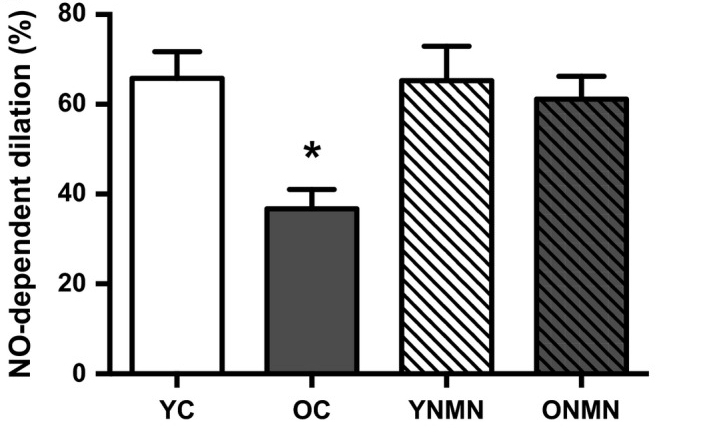NMN Reverses Vascular Dysfunction in Aging Mice
Aged mice that drank water with nicotinamide mononucleotide (NMN) had improved artery function, critical to preventing cardiovascular disease.
Cardiovascular diseases constitute the leading cause of mortality in developed countries, and advancing age is the primary risk factor for cardiovascular disease. Since the projections for number of older adults will likely at least double by 2050, age-related heart disease is now more than ever becoming an issue.
Scientists from the University of Colorado published a study in Aging Cell demonstrating nicotinamide mononucleotide (NMN) reverses vascular dysfunction in mice. NMN boosts levels of nicotinamide adenine dinucleotide (NAD+) in cells. NAD+ levels decrease with age, which scientists have associated with the onset of multiple age-related diseases like cardiovascular disease. These results point to NMN as a potential treatment to reduce the risk of cardiovascular diseases in people.
What is vascular dysfunction?
Vascular dysfunction usually is tied to the stiffening of blood vessels and poorer dilation, which is when blood vessels enlarge so that more blood can be pumped through. With age, levels of collagen — a protein that provides structural integrity of tissues — build up and those of elastin — a protein conferring tissue elasticity — drop.
This stiffening that occurs with age is what often leads to cardiovascular diseases. Along these lines, two key predictors of cardiovascular disease in older adults are vascular dysfunction assessed by the ability of blood vessels to dilate and how stiff they become. Typically, with age, blood vessels become more stiff and have a harder time dilating.
NMN improves the aorta
The University of Colorado Boulder research team wanted to find out if boosting NAD+ levels with NMN improved the function of the aorta, a large vessel in the heart, in aged mice To do so, they gave mice, both young and old, with drinking water with NMN and compared them to each other as well as untreated mice from both age groups.
These older mice that received NMN also showed improvements in the levels of molecules associated with better vascular function. The levels of collagen, a marker of stiffness, were reduced and the levels of elastin, a marker of elasticity, were increased to levels similar to those in young mice. These results show the NMN led to the complete or partial normalization of proteins important for the arterial wall structure.
Older mice given small amounts of NMN in their drinking water throughout the day had normalized stiffness of the aorta, a blood vessel of the heart muscle, which indicated improved heart health. “Together, these observations indicate that NMN reverses large elastic artery stiffening with aging, in part by normalizing collagen and partially preserving elastin in the arterial wall,” concluded de Picciotto and colleagues.

Similarly, older mice that consumed NMN through their drinking water saw improvements in the dilation of their aorta. These improvements were associated with restored availability of NO, which is needed for dilation, and reduced oxidative stress.

“In the present study, we demonstrate a reversal of age‐associated endothelial dysfunction by oral NMN supplementation,” said de Picciotto and colleagues. “Overall, our findings provide the first evidence supporting the promising translational potential of NMN supplementation for the treatment of arterial aging,” stated the scientists in their study.

